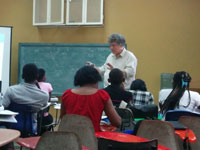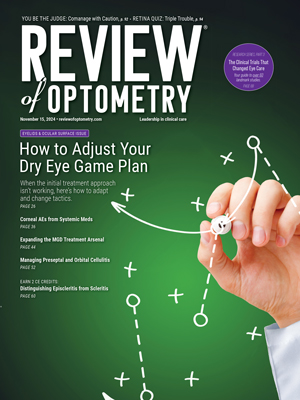In 2011, Jean-Marie Desroches and Carole Melancon returned to their hometown of Quebec from their final trip to Mali. A military coup in March 2012 ended their efforts to establish an optometry program in the large West African republic. But it didn’t end their efforts to spread optometry around the world. When they were contacted by Luigi Bilotto, OD, MS, the director of education for the Brien Holden Vision Institute, about teaching in Haiti’s new optometry program, the married couple jumped at the opportunity.
Dr. Melancon is an optometrist, but Dr. Desroches teaches physics in Quebec. In Haiti, however, she taught an ‘Introduction to Optometry’ course and he taught a course called 'Physical and Geometrical Optics.'
“We very much appreciate being a part of its development,” Dr. Desroches says of their involvement with the Haitian institution, l’Université d’État d’Haïti. “Optometry as a primary health care in Haiti is very much needed. There’s only three optometrists there.”
Indeed, the mission of the program is not only to educate, but to provide Haitian residents much-needed access to basic eye care such as eye health evaluations and refraction testing. “The group was very enthusiastic,” he says of the students there. “They have had courses in common with medical students, but they didn’t really know about the eye specifically.”
 |
| Jean-Marie Desroches teaches an optical geometrics course to the first Haitian optometry class. |
However, communicating with different cultures can require some skill. For instance, Dr. Desroches says the students were in the habit of “learning by rote. We had to undo certain habits,” he explains. “We wanted to know about their competence. I organized some labs and it was the first time in their lives that they did lab reports. That was exciting.”
For the time being, he says, optometry is looking to gain a foothold in Haiti by partnering with ophthalmology. But, when governmental agencies and ophthalmologists embrace optometry’s competency, the hope is that optometrists will eventually open their own offices.
“They have to be very competent to work with ophthalmology in providing eye care—who will then, gradually, understand how valuable this new profession is for them,” he said. “They will have to find an office where they can prove their usefulness. That’s how they will become accepted in the country.”
The Haiti Optometry Program is a collaboration between I’Université d’État d’Haïti, Brien Holden Vision Institute, Optometry Giving Sight, VOSH International and Charity Vision with support from I’Université de Montréal.

